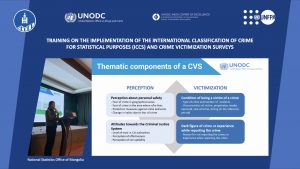LACSI Initiative expands to Asia: Mongolia receives training in victimization surveys
Ulaanbaatar, Mongolia, 24 March 2023. From 21 to 24 March, the UNODC-INEGI Centre of Excellence (CoE), in collaboration with the United Nations Office on Drugs and Crime (UNODC) headquarters and the UNODC-KOSTAT Centre of Excellence for Asia and the Pacific, delivered a training workshop in Mongolia focused on the International Classification of Crime for Statistical Purposes (ICCS) and the implementation of Victimization Surveys to a diverse group of justice sector stakeholders in cooperation with the National Statistical Office of Mongolia. A total of 49 participants attended the workshop, ranging from governmental and academic organizations to international and non-governmental organizations (18 in total[1]).
During the training, the UNODC-INEGI Center of Excellence participated virtually and shared its experience with the Latin America and the Caribbean Crime Victimization Survey Initiative (LACSI), a methodology created by UNODC through the CoE, and supported by UNDP, OAS and IDB, aligned with United Nations international standards such as the ICCS and the UNODC Manual on Victimization Surveys, which addresses the need to create a standardized regional victimization questionnaire to achieve international comparability and its importance to be able to report results for the indicators of the Sustainable Development Goals (SDGs) of the 2030 Agenda.
Mongolia expressed its interest in adopting LACSI for its national survey, which means that the country will be able to generate quality, reliable, timely and comparable statistical information to monitor the progress of SDG 2030, especially one SDG 11 indicator (11.7.2) and four SDG 16 indicators (16.1.3, 16.1.4, 16.3.1 and 16.5.1), indicators under the sole custody of UNODC that promote just, peaceful and inclusive societies.
The CoE will continue with technical support to Mongolia through the Asia Pacific CoE, for the development of its questionnaire, training manuals, field material and guidance in the analysis and use of the data to generate public policies, as well as its dissemination. The survey results are expected to be available in 2024.
[1] National Statistics Office, National Legal Institute, National Committee on Gender Equality, Law Enforcement University, Ministry of Justice and Home Affairs, Independent Authority Against Corruption, National Center Against Violence, Ministry of Labour and Social Protection of Mongolia, Centre for Human Rights and Development, Secretariat of Coordination Council for Crime Prevention in Mongolia, International University of Ulaanbaatar, National Human Rights Commission of Mongolia, General Executive Agency of Court Decision, Prosecutor general’s Office, Judicial General Council, National Police Agency, National Institute for Security Studies, National Institute of Forensic Science.



